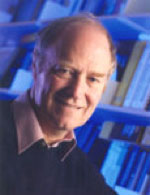Professor Andrew McMichael
International Awards
Hamdan Award for Medical Research Excellence
- Recombinant Vaccines in Infectious Diseases
1999-2000
Professor Andrew McMichael is a world leader in Human Immunology. He is Professor of Immunology at the Oxford University and is the Director of the MRC's Human Immunology Unit at the Institute of Molecular Medicine, John Radcliffe Hospital, Oxford. He is a Fellow of the Royal Society. Professor McMichael obtained his medical degree from the University of Cambridge and Ph.D. at the National Institute for Medical Research in London. The Unit under his directorship in Oxford was set up to increase the PROFESSOR ANDREW MCMICHAEL understanding of human immune responses at the cellular and molecular level, one aspect of which is the development of a new DNA vaccine against HIV infection. The work nominated for the award shows that there is a direct relationship between HIV-l cytotoxic T lymphocyte (CTL) activity and levels of circulating virus in the blood.
This strongly supported the hypothesis that ens were important in controlling HIV infection, and encouraged development of a vaccine against HIV that would specifically stimulate this type of immune response. Plasma viral RNA is an excellent predictor of clinical outcome of individuals infected with HIV-l. Cytotoxic T lymphocytes had been believed to be important in the control of HIV infection through correlative observations and indirect assays of function. Not only did CDB T cells kill HIV¬infected cells, but in vitro they also inhibited HIV replication through production of chemokines. However, there had been no direct demonstration of a relationship between viral load and uncultured, circulating HIV specific Cll,s. Professor McMichael's team developed a highly sensitive method to measure Hlv-specilic circulating T cells. They used this improved method to measure ens in HIV-l positive patients before and after 6 months of triple combination antiretroviral therapy. First they showed a highly significant inverse relationship between HIV specific eTL activity and HIV-l RNA levels in plasma.
In addition, they demonstrated that the lower viral loads were caused by higher en activity, rather than high virus levels inhibiting CTLs. Circulating virus was lowered with antiretroviral therapy. After 6 months all patients had undetectable virus and much lower HIV-specific cn responses, showing that the virus did not inhibit en activity and that maintenance of HIV specific CTL activity depends on continued replication of virus. This work was also significant in that the highly sensitive human leukocyte antigen (HLA)-tetramer technology developed by the group and described in the paper has enhanced the ability of researchers to directly visualise antigen specific T cells using flow cytometry. It has provided on invaluable tool to other HIV vaccine researchers. A Phase I clinical trial of the novel vaccine will be conducted in Oxford early next year followed by a similar phase I trial in Kenya beginning about three months later. Professor McMichael has excellent links in Kenya that helped with the difficulties of setting up an HIV vaccine trial in Africa.
The vaccine has been designed primarily to protect against HIV clades that predominate in Africa. It is anticipated that, if shown to be effective, it would be straightforward to modify the vaccine to cover HIV clades found in the rest of the world.

